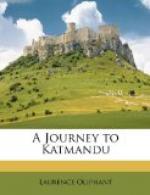This range is called by Hodgson the sandstone range; it does not rise more than 600 feet from its immediate base, its elevation above the sea being about 3000 feet. The pass itself, by which we crossed the Cheriagotty hills, was a mere watercourse, sometimes so narrow that the banks on each side might be touched from the back of the elephant, and so steep and rocky that, both in ascending and descending into the dry bed of a torrent, the animal found no little difficulty in keeping his footing.
It was in this place that some of the severest fighting took place in 1816 during the Nepaulese war. Commanded by the surrounding heights and crowned by the temporary stockades of the Ghorkas, it was a dangerous and formidable obstacle to the progress of our army; but the able tactics of Sir David Ochterlony successfully overcame it. In the very watercourse we were now traversing the carcase of a dead elephant had, on one occasion during that campaign, fallen in such a manner as effectually to block up the way; and so narrow is the path, and so steep the banks on each side, that the army was absolutely delayed some time until this cumbrous impediment was removed.
After descending into the bed of the Chyria Nuddee our road lay through the saul forest, the magnificent trees of which served as a grateful shade for some miles, while, the road being comparatively level and free from impediments, our journey was most agreeable. A short distance from our destination we crossed the Kurroo Nuddee, by a picturesque wooden bridge peculiar to the Himalayas.
Hetowra is a place of considerable importance in a mercantile point of view, but it is not gay except during the season; it is, in fact, fashionable only while it is healthy. From this place two roads lead to Katmandu. The whole of our week’s stay in the Terai was rendered interesting to us from the recollection that in this province originated a war as disastrous to our troops as it was unprovoked by us. Never in our eastern experience have we commenced hostilities with a native power upon more justifiable grounds, and seldom have we paid more dearly for the satisfaction of at last dictating terms, from which indeed we have since reaped no great advantage. At Persa, but a short distance from Bisoleah, Captain Sibley and his detachment fell into the hands of the enemy, losing two guns and three-fourths of his men. Major-General Gillespie fell at the storming of Kalunga, while gallantly cheering on his men; our casualties here amounting to 225, twenty of whom were officers. Beaten back on this occasion, we were no less unsuccessful in a second attempt, losing in killed and wounded 483 men, including eleven officers. It was only when General Ochterlony assumed the command that affairs began to wear a brighter aspect. The energy and ability of this officer were displayed in a series of operations which daunted the enemy in proportion as they inspired confidence amongst our own ranks,




